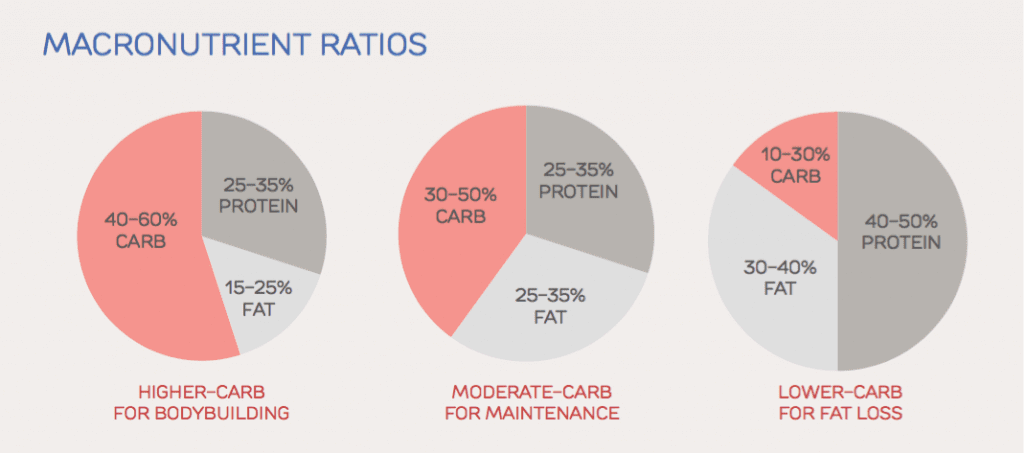
Part 2 – Calories (Macro Nutrient Needs)
Macro nutrients are the three types of foods that provide you with calories. You might be familiar with them: protein, carbohydrate and fat. You can read The Basics Of Nutrition for more on those.
The information below is only a guideline and you may need more calories depending on your exercise levels.

Protein
- It’s recommended to get between 1.1 to 2.2 grams of protein per kg of Lean Body Mass.
- Over 2 grams is for those doing regular Strength Training.
Fat
- A minimum of 1 gram per kg of Lean Body Mass is considered optimal for absorption of fat soluble vitamins and hormone balance.
- If you are exercising, 1 to 1.2 grams per kg Lean Body Mass should be sufficient.
- If you are inactive then 1.2 to 1.5 grams per kg Lean Body Mass is good, coupled with a decrease in carbohydrate intake.
- There is no real “upper limit” on fats, as long as they are making a healthy contribution to your total calories.
Carbohydrate
- A minimum of 100 grams per day is required for optimal brain function.
- Carbohydrate is the main source of fuel for intense workouts, so don’t fear carbohydrate before, during and after a workout.
- It is not uncommon to see people consume 3-4 grams per kg Lean Body Mass on an intense workout day.
- Of the three macro nutrients, carbohydrates are the most flexible in terms of making up your calories.
- There is no upper limit, as long as your exercise levels were demanding enough to require the calories.

Total Calories
Medical experts agree that anything below 1200kcals a day will likely impair the body’s ability to take on all the nutrients it requires. Diets should use 1200kcals a day (1500kcals for men) as a minimum intake.
While staying above the minimum intake, nutritionists recommend consuming around 500 calories below your expenditure for fat loss, and 500 calories above your expenditure for weight gain. If you do not exercise at all when dieting then your body may burn muscle, slowing your metabolism and making it harder to lose weight.
Find out how to calculate your lean body mass.
How Do I Use This Information?
Make a note of these numbers. Count your calories in a given day. Is there a nutrient where your intake is too high? How about one that is too low?
Not Enough Protein
- If you aren’t getting enough protein then you are likely doing some damage to your health and well-being.
- Protein is a building block of muscle, and that includes muscles like you heart.
- If your body can’t get enough protein it will break down existing muscle to provide your body with it.
- You will experience muscle wastage. You will also compromise your immune system.
Too Much Protein
- The average recreational gym-goer is likely over-doing it on the protein intake.
- If you are following a muscle-building plan, these could be tailored to people taking steroids, or backed by supplement companies trying to sell their product.
- If you aren’t a 250lb monster you likely can’t utilise 200 grams of protein in a day.
- Most of the articles advising a higher protein intake are written by websites selling supplements.
- Someone like Kai Greene was already that size when he got his supplement sponsor.

Not Enough Fat
- If you are below the minimum fat intake, your body is likely unable to absorb certain vitamins properly.
- It also affects mood and can lead to depression.
- If you aren’t getting enough good cholesterol your health will suffer.
- While most people assume that less fat will help weight loss, the truth is low fat diets likely increase weight gain as you are making up the difference with Carbohydrates.
- You are more prone to over-eating as fat leaves you feeling full, which carbohydrate doesn’t do as well.

Not Enough Carbohydrate
- You are unlikely to be too low on carbohydrates unless you are purposefully following a diet plan that requires low carbs.
- If you are low on carbohydrate you could experience brain fog, and have memory loss, irritability and an inability to concentrate.
- If you don’t have adequate carbohydrate before exercise you will feel sluggish as your body can only use fat as energy at a very slow rate, so could burn muscle for high intensity activity.
- Try to use carbohydrate to match your energy needs for the day – eat it before, during and after a workout, and try to cut down on days you are inactive.

Too Much Carbohydrate
- For the average person, this will likely be the biggest issue.
- With the “low fat fear” movement, companies took all the fat out products and replaced it with sugar.
- You should be particularly aware of your sugar intake which should be kept to a minimum, unless you are exercising regularly – and even then it should be centred around your workout.
- Try to aim for 100 grams a day once a week and see just how different that is to your regular day. It’s best to try this when you don’t have a busy work day.
Example Diets
90kg male with 20% body fat
If I am a 90kg man, with 20% fat then my lean body dass is 72kg.
- Protein is between 79 and 158 grams.
- Fat is between 72 and 119 grams.
- Carbohydrate is between 100 and 288 grams.
On a day I am inactive I might consume 120 grams of protein, 110 grams of fat and 140 grams of carbohydrate. That works out at 2030 calories.
On a day I am exercising I might consume 140 grams of protein, 80 grams of fat and 260 grams of carbohydrate. That works out at 2320 calories.
70kg female with 30% body fat
If I am a 70kg woman, with 30% fat then my Lean Body Mass is 49kg.
- Protein is between 54 and 108 grams.
- Fat is between 49 and 81 grams.
- Carbohydrate is between 100 and 196 grams.
On a day I am inactive I might consume 85 grams of protein, 75 grams of fat and 120 grams of carbohydrate. That works out at 1495 calories.
On a day I am exercising I might consume 100 grams of protein, 60 grams of fat and 180 grams of carbohydrate. That works out at 1660 calories.
Remember these are guidelines, use your own judgement. If you are light-headed, dizzy or weak then you need more calories. You should not feel excessively hungry if you eat well.

